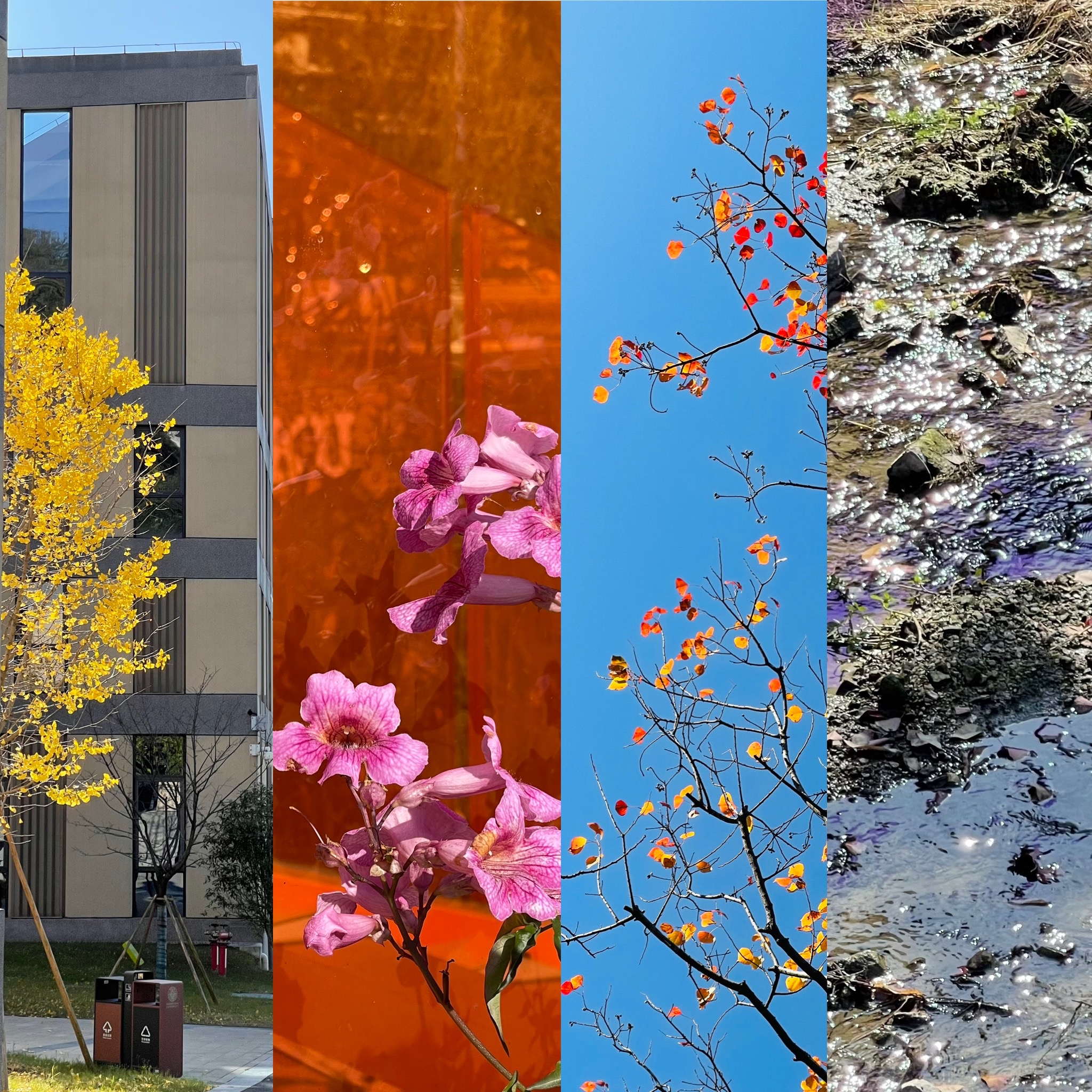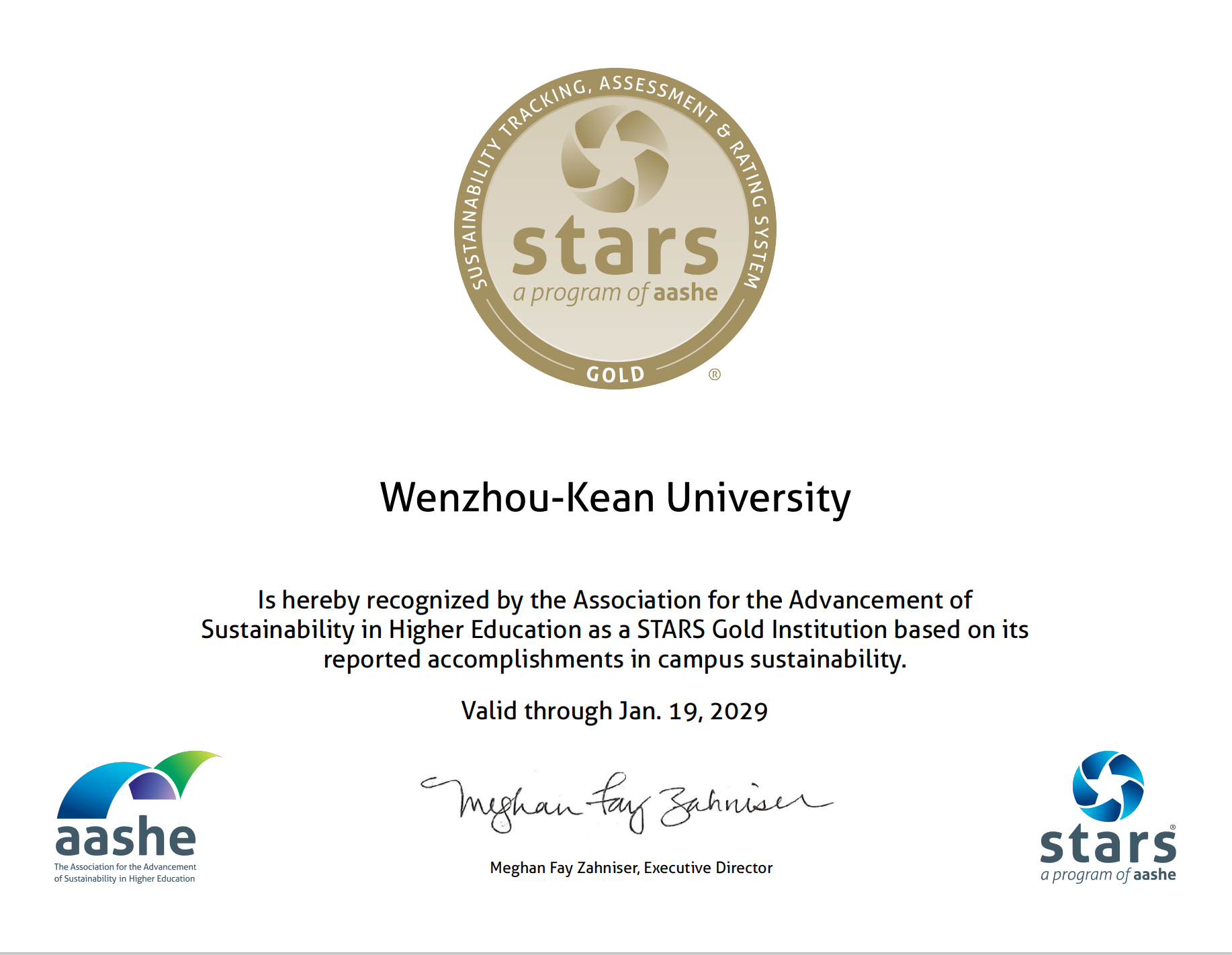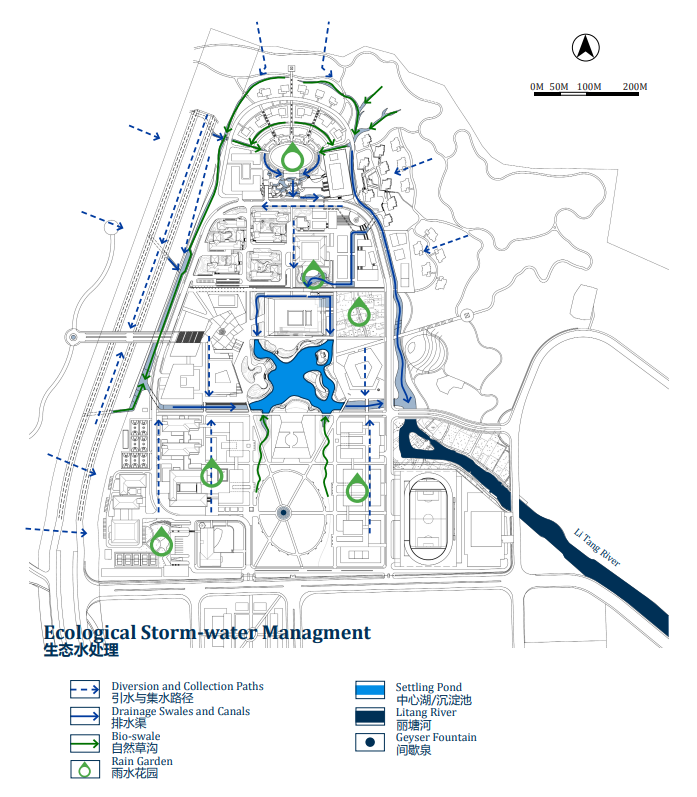
Achievements

"Kean University is committed to sustainability goals across the institution – from physical improvements such as the EV charging stations to research focused on the environment and environmental justice."
- Kean President Lamont O. Repollet, Ed.D.
In 2022, as one of the first batch of universities and colleges in Zhejiang Province, WKU was successfully rated as the Zhejiang Provincial Green School.
Wenzhou Kean University has been built as a multi-cultural, innovative, ecological, and world-class university. It’s designed as a pedestrian-friendly campus, where all circulation is for walking and cycling, with vehicular servicing and emergency access provided. The ecological concept of the sponge campus takes advantage of the prevalence of water in the area and is introduced to blend campus, park, and home in trinity. We incorporate the sponge city concept throughout all stages of planning, design, construction, and maintenance at every level. This idea of sponge city was also reported and highly praised by the Wenzhou official authoritative media.

Ecological Storm-water Management Sponge City
The water management system is based upon the natural flow paths from foothills to the main watercourse of the Li Tang River. A combination of wet and dry swales are proposed that filter, cleanse and settle collected runoff before discharging it, thereby passing the water quality on at a high level of treatment. The main components, from upper to lower catchment are:
Diversion and Collection Paths: Surface flows across roads and car-parks will incorporate a higher level of ground infiltration to reduce the overall catchment volume.
Bio-Filter Runoff Swales: Linear low-flow bio-swales, vegetated with reeds and low-maintenance native grasses will provide a first-cut filtering of main oils and pollutants.
Drainage Swales and Canals: A series of cascades and waterfalls that aerate and activate the water as it reaches the lower basin and central settling pond.
Settling Pond and Water Gate: The central lake, due to its large volume of water and position as the lowest point on the campus, the mobility of water body is low, therefore water quality is easy to deteriorate and water treatment is necessary. Assuming the central lake’s cycle period is 5 days and capacity of water treatment 200 m3 per hour, ecological circulating water treatment should be adopted with regard to cost and energy conservation.
Rainwater garden: Construct the rainwater garden system with ecological car park, courtyards, lawns, roof gardens in coordination with the existing ecological grass ditches.
Main River Channel: The Li Tang River Channel has many sources of water and requires a strong edge filtration zone of riparian planting.
Geyser Fountain: A large geyser fountain supplied by a pipe from a reservoir to be located along one of the permanent streams running down the hillside. Overflow will keep adjacent bio-swales wet to allow use of aquatic plants and flowers.
We have joined the Carbon Neutral Initiative of Chinese High-Education Campuses, and we are committed to:
(1) We will implement the Campus Carbon Neutral Action Plan in response to the United Nations Sustainable Development Goals and China's Carbon Neutral Goal by implementing the concept of green and sustainable development on campus;
(2) Strive to realize clean and low-carbon use of energy and improve the efficiency of energy utilization in campus planning, construction, operation, and management. Play a pioneering role in realizing a carbon-neutral society, and strive to take the lead in achieving the goal of a carbon-neutral campus by 2050;
(3) Actively create a green culture on campus, advocate a low-carbon lifestyle on campus, and form a green trend;
(4) Actively carry out low-carbon science popularization education, and scientific and technological innovation activities, so as to engage the whole community to build a green campus;
(5) Actively carry out carbon-neutral international cooperation and exchange activities, and convey China's sustainable development messages.

Besides the three achievements above, WKU has great contributions in many areas regarding sustanability.
-
In 2021, our students won the “First Runner-up Student Presentation Award” at the Asian Sustainable Campus Network (ASCN) Conference.
-
In 2020, WKU was recognized as the Provincial Water-saving Institution.
-
In 2018, Dr. Toby Michelena, assistant professor in biology at WKU was named as “the Greatest Contributor to Water Harnessing” by the Wenzhou Municipal Propaganda Department and the Municipal Water Conservancy Office.
-
In 2017, Yichen Wang, an accounting major student at WKU, attended a global climate conference. Minhui Lou, a marketing major student at WKU, attended the United Nations Climate Change Conference, bringing the Chinese young generation's attitude towards environmental protection to the world stage.
-
Our students have been presented with many awards in sustainability-related competitions.
-
WKU is also playing a significant role in assisting in formulating the standard for evaluating “Zero Carbon Campus” in China.
Subscribe to our newsletter or join us on social to be part of the community!
